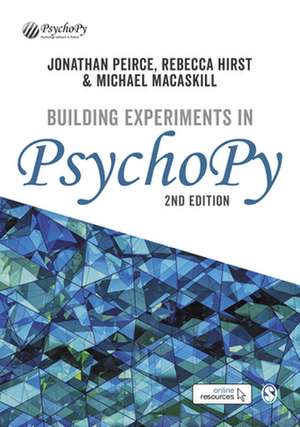Building Experiments in PsychoPy
Autor Jonathan Peirce, Rebecca Hirst, Michael MacAskillen Limba Engleză Paperback – 2 feb 2022
Divided into three parts and with unique extension exercises to guide you at whatever level you are at, this textbook is the perfect tool for teaching practical undergraduate classes on research methods, as well as acting as a comprehensive reference text for the professional scientist.
Essential reading for anyone using PsychoPy software, the second edition has been fully updated and includes multiple new chapters about features included in recent versions of PsychoPy, including running studies online and collecting survey data.
Part I teaches you all the basic skills you need (and some more advanced tips along the way) to design experiments in behavioral sciences. Each chapter introduces anew concept but will offer a series of working experiments that you can build on.
Part II presents more details important for professional scientists intending to use PsychoPy for published research. This part is recommended reading for science professionals in any discipline.
Part III covers a range of specialist topics, such as those doing fMRI research, or those studying visual perception.
“This book fills an incredibly important gap in the field. Many users of PsychoPy will be excited to learn that there is now a highly accessible and well-designed written guide to refine their skills.” – Susanne Quadflieg, University of Bristol
| Toate formatele și edițiile | Preț | Express |
|---|---|---|
| Paperback (1) | 342.91 lei 3-5 săpt. | +27.17 lei 7-13 zile |
| SAGE Publications – 2 feb 2022 | 342.91 lei 3-5 săpt. | +27.17 lei 7-13 zile |
| Hardback (1) | 957.20 lei 6-8 săpt. | |
| SAGE Publications – 3 feb 2022 | 957.20 lei 6-8 săpt. |
Preț: 342.91 lei
Nou
65.62€ • 71.50$ • 55.29£
Carte disponibilă
Livrare economică 02-16 aprilie
Livrare express 19-25 martie pentru 37.16 lei
Specificații
ISBN-10: 1529741653
Pagini: 312
Dimensiuni: 170 x 242 x 23 mm
Greutate: 0.5 kg
Ediția:Second Edition
Editura: SAGE Publications
Colecția Sage Publications Ltd
Locul publicării:London, United Kingdom
Recenzii
In ye olden days when I was a student, we had to script our experiments, which was tedious and error-prone, or use proprietary software, which was expensive and inflexible. This is why I love PsychoPy Builder, and Building Experiments in PsychoPy is a great resource for today‘s budding experimenters.
Cuprins
PART I: FOR THE BEGINNER
Chapter 2: Building your first experiment
Chapter 3: Using images: A study into face perception
Chapter 4: Timing and brief stimuli: Posner cueing
Chapter 5: Running studies online
Chapter 6: Creating dynamic stimuli (revealing text and moving stimuli)
Chapter 7: Providing feedback: Simple code components
Chapter 8: Collecting survey data using forms
Chapter 9: Using sliders
Chapter 10: Randomizing and counterbalancing blocks of trials: A bilingual Stroop task
Chapter 11: Using the mouse for input: Creating a visual search task
PART II: FOR THE PROFESSIONAL
Chapter 12: Implementing research designs with randomization
Chapter 13: Coordinates and color spaces
Chapter 14: Understanding your computer timing issues
Chapter 15: Monitors and monitor center
Chapter 16: Debugging your experiment
Chapter 17: Pro tips, tricks, and lesser-known features
PART III: FOR THE SPECIALIST
Chapter 18: Psychophysics, stimuli and staircases
Chapter 19: Building an FMRI study
Chapter 20: Building an EEG study
Chapter 21: Add eye tracking to your experiment
Appendices
Notă biografică
Jonathan Peirceis Associate Professor in Psychology at the University of Nottingham, with a background in visual neuroscience and a particular interest in research methods. For his research, Jon needed precise (and dynamic) stimulus presentations. For teaching psychology undergraduates about research methods, he needed software that was intuitive enough for them to understand. The combination of these needs (and his generally geekiness) caused Jon gradually to create PsychoPy. Happily, many people have got on board with the project and it grew.
When he isn¿t designing experiments, writing software or trying to teach students to be awesome scientists, Jon can be found walking his dog, playing with his daughter or making unpleasant noises on a guitar.
